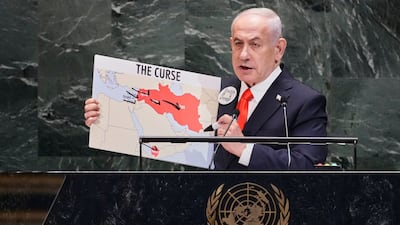Just before the two-year anniversary of the October 7 attacks, Prime Minister Benjamin Netanyahu called for Israel to become a “super-Sparta”.
After so much fighting and mounting international isolation, the comparison to a militarised, self-reliant and besieged city of antiquity seemed odd, and many Israelis, including senior business leaders, disagreed quickly and firmly.
Israelis are used to their government having to defend its condemned military conduct, but a conflict risking its ties to the world seemed, for many, a step too far. Mr Netanyahu then rowed back and said he was talking specifically about the arms industry and security.
It was a revealing episode in the conversation about whether Israel is winning the war in Gaza, the longest in its history. Despite the Prime Minister’s promises of “total victory” and trumpeting of major military successes, there are signs that many Israelis disagree.
Two years on, The National spoke to Israeli experts who have been observing the state of Israel and its standing abroad, to get a sense of where the debate about victory stands. The picture, backed up by the latest polling data, is complicated, even as Israel and Hamas accept a US plan to end the war.
“It’s a mixed bag. I don’t think there is a way out of the very bottom line that we lost the war on October 7,” said Nimrod Novik, an Israeli peace negotiator and former senior adviser to the late Israeli prime minister Shimon Peres.
“We demonstrated the amazing intelligence and operational capabilities of our security services in Lebanon, Syria, Iraq and, primarily, Iran. Even vis-à-vis the Houthis, we restored our confidence in our security establishment, which collapsed after October 7,” he added.
“At the same time, the fact that we’ve failed to accomplish set objectives in Gaza, vis-à-vis the weakest of our adversaries, is a major stain on this scorecard. That has nothing to do with the security establishment in my judgment. It derives from the fact that the war has been dragging on beyond its justified and purposeful phase.”
Former senior Israeli diplomat Alon Pinkas had a similar assessment about Gaza, and argued that Israel’s regional victories are less significant than Mr Netanyahu proclaims.
“Netanyahu lost the war in the sense that he was responsible for the calamity and debacle of October 7. He hasn’t defeated Hamas to the point of surrender. Remember all his clichés: to decimate, annihilate, obliterate, total victory. Yes, Hamas has been severely beaten, but that didn’t happen,” Mr Pinkas said.
“In his mind, he’s winning because he deludes himself into thinking that he actually reshaped the Middle East, but it was temporary.”
Falsehood of statements
Referring to the departure of Syria’s former leader Bashar Al Assad, Mr Pinkas stated that “Syria was unstable to begin with, so that didn’t change much.”
“There’s no question that the so-called Iranian web has been weakened, but how does that change Israel’s geopolitical position? It doesn’t, because Israel is now seen very suspiciously around the Middle East.”
Both agreed that a barrier to any sense of Israeli victory was the very battle that began the war: the one with Hamas.
For reasons that seem to have nothing to do with national security, the military has been instructed time and time again to continue the war.
It is no longer a secret that the military is reluctant to do so. The military is conducting the current Gaza operation as slowly as it can in the hope that diplomacy will kick in and be able to stop it, because they see no interest in the reoccupation of Gaza.
The argument comes after the army killed more than 65,000 Palestinians, mostly civilians, and destroyed most of Gaza.
“Netanyahu pursued a wrong strategy for a decade of weakening Palestinian moderates in the Palestinian Authority and solidifying the control of the radicals in Hamas in Gaza. That is a strategic failure,” Mr Novik said.
Mr Pinkas claimed that the Gaza war demonstrated the falsehood of Mr Netanyahu’s “longtime premise that you can remodel the Middle East and reach accommodation with the Arab world without dealing with the Palestinians”.
“What happened on October 7 showed the exact opposite,” he added.
Last month, several countries, including France, recognised Palestinian statehood. A Gaza ceasefire plan represented by US President Donald Trump, despite the ambiguity in it, also acknowledged the right of self-determination.
The Israeli Prime Minister said he approved the plan, but then went out to claim that the war would not stop before the “total victory” over Hamas.
Diplomatic tsunami
Israel’s increasing international isolation, amid anger over its conduct during the war and mounting accusations that it is committing genocide against the Palestinians, were also a major factor in denying any sense of Israeli victory.
The phenomenon is known in Israel as the “diplomatic tsunami,” a term that took on new weight after many of its closest western allies recognised a Palestinian state.
Polling from the leading Israeli think Tank IDI in September showed a “notable shift” in what Israelis regard as the main threat to their country since last year. A full-scale multi-front war just remains the highest threat, but “international isolation and boycotts” more than doubled in a year and a “loss of American support for Israel” almost doubled, too.
“Israel is isolated, condemned globally, and public opinion in most countries, including in the US has turned against Israel in the last two years. There’s very little to show for his supposedly strategic accomplishments in the Middle East,” said Mr Pinkas.
A recent survey by The New York Times showed that support for Israel among US voters has declined 13 percentage points over the past year.
Isolation has also raised significant fears over the well-being of Israel’s economy. Economist David Rosenberg said the economy has fared surprisingly well up until now, but major challenges are emerging, driven by international anger at Israel.
“The economy hasn’t imploded. You could even say things are settled into a reasonable growth trajectory. This is an unusual, even by Israeli standards, but the economy is used to war interruptions of various kinds,” Mr Rosenberg said.
Mounting evidence of sanctions and business-to-business and consumer boycotts is a danger, however, Mr Rosenberg added.
“The latest figures on exports to Europe show a sharp decline. It’s not been long enough to be sure it’s a trend, but it’s worrying that it’s coming as public opinion in Europe, Israel’s biggest trading partner, is running against Israel,” he said.
Countries like Germany and Spain have recently hit Israel with major arms embargoes and, in the case of Spain, have cancelled arms deals.
The next big turn in the debate about victory will be the elections. By electoral law, unless Mr Netanyahu manages to change it as some believe he will try to, these will have to take place at the latest in a year. There is a chance they happen even sooner if his government becomes unviable, which is quite possible amid tensions in the cabinet over the latest deal.
Until then, there is little certainty about where Mr Netanyahu will take Israel.
Moral education needed in a 'rapidly changing world'
Moral education lessons for young people is needed in a rapidly changing world, the head of the programme said.
Alanood Al Kaabi, head of programmes at the Education Affairs Office of the Crown Price Court - Abu Dhabi, said: "The Crown Price Court is fully behind this initiative and have already seen the curriculum succeed in empowering young people and providing them with the necessary tools to succeed in building the future of the nation at all levels.
"Moral education touches on every aspect and subject that children engage in.
"It is not just limited to science or maths but it is involved in all subjects and it is helping children to adapt to integral moral practises.
"The moral education programme has been designed to develop children holistically in a world being rapidly transformed by technology and globalisation."
Specs%3A%202024%20McLaren%20Artura%20Spider
%3Cp%3E%3Cstrong%3EEngine%3A%3C%2Fstrong%3E%203.0-litre%20twin-turbo%20V6%20and%20electric%20motor%3Cbr%3E%3Cstrong%3EMax%20power%3A%3C%2Fstrong%3E%20700hp%20at%207%2C500rpm%3Cbr%3E%3Cstrong%3EMax%20torque%3A%3C%2Fstrong%3E%20720Nm%20at%202%2C250rpm%3Cbr%3E%3Cstrong%3ETransmission%3A%3C%2Fstrong%3E%20Eight-speed%20dual-clutch%20auto%3Cbr%3E%3Cstrong%3E0-100km%2Fh%3A%3C%2Fstrong%3E%203.0sec%3Cbr%3E%3Cstrong%3ETop%20speed%3A%20%3C%2Fstrong%3E330kph%3Cbr%3E%3Cstrong%3EPrice%3A%3C%2Fstrong%3E%20From%20Dh1.14%20million%20(%24311%2C000)%3Cbr%3E%3Cstrong%3EOn%20sale%3A%3C%2Fstrong%3E%20Now%3C%2Fp%3E%0A
SPEC%20SHEET%3A%20SAMSUNG%20GALAXY%20S24%20ULTRA
%3Cp%3E%3Cstrong%3EDisplay%3A%3C%2Fstrong%3E%206.8%22%20quad-HD%2B%20dynamic%20Amoled%202X%2C%203120%20x%201440%2C%20505ppi%2C%20HDR10%2B%2C%20120Hz%3C%2Fp%3E%0A%3Cp%3E%3Cstrong%3EProcessor%3A%3C%2Fstrong%3E%204nm%20Qualcomm%20Snapdragon%208%20Gen%203%2C%2064-bit%20octa-core%3C%2Fp%3E%0A%3Cp%3E%3Cstrong%3EMemory%3A%3C%2Fstrong%3E%2012GB%20RAM%3C%2Fp%3E%0A%3Cp%3E%3Cstrong%3EStorage%3A%3C%2Fstrong%3E%20256%2F512GB%20%2F%201TB%3C%2Fp%3E%0A%3Cp%3E%3Cstrong%3EPlatform%3A%3C%2Fstrong%3E%20Android%2014%2C%20One%20UI%206.1%3C%2Fp%3E%0A%3Cp%3E%3Cstrong%3EMain%20camera%3A%3C%2Fstrong%3E%20quad%20200MP%20wide%20f%2F1.7%20%2B%2050MP%20periscope%20telephoto%20f%2F3.4%20with%205x%20optical%2F10x%20optical%20quality%20zoom%20%2B%2010MP%20telephoto%202.4%20with%203x%20optical%20zoom%20%2B%2012MP%20ultra-wide%20f%2F2.2%3B%20100x%20Space%20Zoom%3B%20auto%20HDR%2C%20expert%20RAW%3C%2Fp%3E%0A%3Cp%3E%3Cstrong%3EVideo%3A%3C%2Fstrong%3E%208K%4024%2F30fps%2C%204K%4030%2F60%2F120fps%2C%20full-HD%4030%2F60%2F240fps%2C%20full-HD%20super%20slo-mo%40960fps%3C%2Fp%3E%0A%3Cp%3E%3Cstrong%3EFront%20camera%3A%3C%2Fstrong%3E%2012MP%20f%2F2.2%3C%2Fp%3E%0A%3Cp%3E%3Cstrong%3EBattery%3A%3C%2Fstrong%3E%205000mAh%2C%20fast%20wireless%20charging%202.0%2C%20Wireless%20PowerShare%3C%2Fp%3E%0A%3Cp%3E%3Cstrong%3EConnectivity%3A%3C%2Fstrong%3E%205G%2C%20Wi-Fi%2C%20Bluetooth%205.3%2C%20NFC%3C%2Fp%3E%0A%3Cp%3E%3Cstrong%3EI%2FO%3A%3C%2Fstrong%3E%20USB-C%3B%20built-in%20Galaxy%20S%20Pen%3C%2Fp%3E%0A%3Cp%3E%3Cstrong%3EDurability%3A%3C%2Fstrong%3E%20IP68%2C%20up%20to%201.5m%20of%20freshwater%20up%20to%2030%20minutes%3B%20dust-resistant%26nbsp%3B%3C%2Fp%3E%0A%3Cp%3E%3Cstrong%3ESIM%3A%3C%2Fstrong%3E%20Nano%20%2B%20nano%20%2F%20nano%20%2B%20eSIM%20%2F%20dual%20eSIM%20(varies%20in%20different%20markets)%3C%2Fp%3E%0A%3Cp%3E%3Cstrong%3EColours%3A%3C%2Fstrong%3E%20Titanium%20black%2C%20titanium%20grey%2C%20titanium%20violet%2C%20titanium%20yellow%3C%2Fp%3E%0A%3Cp%3E%3Cstrong%3EIn%20the%20box%3A%20%3C%2Fstrong%3EGalaxy%20S24%20Ultra%2C%20USB-C-to-C%20cable%26nbsp%3B%3C%2Fp%3E%0A%3Cp%3E%3Cstrong%3EPrice%3A%3C%2Fstrong%3E%20Dh5%2C099%20for%20256GB%2C%20Dh5%2C599%20for%20512GB%2C%20Dh6%2C599%20for%201TB%3C%2Fp%3E%0A
'The Woman in the House Across the Street from the Girl in the Window'
Director:Michael Lehmann
Stars:Kristen Bell
Rating: 1/5
SPECS
Engine: 4-litre V8 twin-turbo
Power: 630hp
Torque: 850Nm
Transmission: 8-speed Tiptronic automatic
Price: From Dh599,000
On sale: Now
Crazy Rich Asians
Director: Jon M Chu
Starring: Constance Wu, Henry Golding, Michelle Yeon, Gemma Chan
Four stars
COMPANY%20PROFILE
%3Cp%3E%3Cstrong%3ECompany%3A%20%3C%2Fstrong%3EMascotte%20Health%3C%2Fp%3E%0A%3Cp%3E%3Cstrong%3EStarted%3A%20%3C%2Fstrong%3E2023%3C%2Fp%3E%0A%3Cp%3E%3Cstrong%3EBased%3A%20%3C%2Fstrong%3EMiami%2C%20US%3C%2Fp%3E%0A%3Cp%3E%3Cstrong%3EFounder%3A%3C%2Fstrong%3E%20Bora%20Hamamcioglu%3C%2Fp%3E%0A%3Cp%3E%3Cstrong%3ESector%3A%20%3C%2Fstrong%3EOnline%20veterinary%20service%20provider%3C%2Fp%3E%0A%3Cp%3E%3Cstrong%3EInvestment%20stage%3A%3C%2Fstrong%3E%20%241.2%20million%20raised%20in%20seed%20funding%3C%2Fp%3E%0A
Terror attacks in Paris, November 13, 2015
- At 9.16pm, three suicide attackers killed one person outside the Atade de France during a foootball match between France and Germany
- At 9.25pm, three attackers opened fire on restaurants and cafes over 20 minutes, killing 39 people
- Shortly after 9.40pm, three other attackers launched a three-hour raid on the Bataclan, in which 1,500 people had gathered to watch a rock concert. In total, 90 people were killed
- Salah Abdeslam, the only survivor of the terrorists, did not directly participate in the attacks, thought to be due to a technical glitch in his suicide vest
- He fled to Belgium and was involved in attacks on Brussels in March 2016. He is serving a life sentence in France
SPEC%20SHEET%3A%20SAMSUNG%20GALAXY%20Z%20FOLD5
%3Cp%3E%3Cstrong%3EMain%20display%3A%3C%2Fstrong%3E%207.6%22%20QXGA%2B%20Dynamic%20Amoled%202X%2C%20Infinity%20Flex%2C%202176%20x%201812%2C%2021.6%3A18%2C%20374ppi%2C%20HDR10%2B%2C%20up%20to%20120Hz%3C%2Fp%3E%0A%3Cp%3E%3Cstrong%3ECover%20display%3A%3C%2Fstrong%3E%206.2%22%20HD%2B%20Dynamic%20Amoled%202X%2C%202316%20x%20904%2C%2023.1%3A9%2C%20402ppi%2C%20up%20to%20120Hz%3C%2Fp%3E%0A%3Cp%3E%3Cstrong%3EProcessor%3A%3C%2Fstrong%3E%20Qualcomm%20Snapdragon%208%20Gen%202%2C%204nm%2C%20octa-core%3B%20Adreno%20740%20GPU%3C%2Fp%3E%0A%3Cp%3E%3Cstrong%3EMemory%3A%3C%2Fstrong%3E%2012GB%3C%2Fp%3E%0A%3Cp%3E%3Cstrong%3ECapacity%3A%3C%2Fstrong%3E%20256%2F512GB%20%2F%201TB%20(online%20exclusive)%3C%2Fp%3E%0A%3Cp%3E%3Cstrong%3EPlatform%3A%3C%2Fstrong%3E%20Android%2013%2C%20One%20UI%205.1.1%3C%2Fp%3E%0A%3Cp%3E%3Cstrong%3EMain%20camera%3A%3C%2Fstrong%3E%20Triple%2012MP%20ultra-wide%20(f%2F2.2)%20%2B%2050MP%20wide%20(f%2F1.8)%20%2B%2010MP%20telephoto%20(f%2F2.4)%2C%20dual%20OIS%2C%203x%20optical%20zoom%2C%2030x%20Space%20Zoom%2C%20portrait%2C%20super%20slo-mo%3C%2Fp%3E%0A%3Cp%3E%3Cstrong%3EVideo%3A%3C%2Fstrong%3E%208K%4024fps%2C%204K%4060fps%2C%20full-HD%4060%2F240fps%2C%20HD%40960fps%3B%20slo-mo%4060%2F240%2F960fps%3B%20HDR10%2B%3C%2Fp%3E%0A%3Cp%3E%3Cstrong%3ECover%20camera%3A%3C%2Fstrong%3E%2010MP%20(f%2F2.2)%3C%2Fp%3E%0A%3Cp%3E%3Cstrong%3EInner%20front%20camera%3A%3C%2Fstrong%3E%20Under-display%204MP%20(f%2F1.8)%3C%2Fp%3E%0A%3Cp%3E%3Cstrong%3EBattery%3A%3C%2Fstrong%3E%204400mAh%2C%2025W%20fast%20charging%2C%2015W%20wireless%2C%204.5W%20reverse%20wireless%3C%2Fp%3E%0A%3Cp%3E%3Cstrong%3EConnectivity%3A%3C%2Fstrong%3E%205G%3B%20Wi-Fi%2C%20Bluetooth%205.3%2C%20NFC%20(Samsung%20Pay)%3C%2Fp%3E%0A%3Cp%3E%3Cstrong%3EI%2FO%3A%3C%2Fstrong%3E%20USB-C%3C%2Fp%3E%0A%3Cp%3E%3Cstrong%3ECards%3A%3C%2Fstrong%3E%20Nano-SIM%20%2B%20eSIM%3B%20dual%20nano-SIMs%20%2B%20eSIM%3C%2Fp%3E%0A%3Cp%3E%3Cstrong%3EColours%3A%3C%2Fstrong%3E%20Cream%2C%20icy%20blue%2C%20phantom%20black%3B%20online%20exclusives%20%E2%80%93%20blue%2C%20grey%3C%2Fp%3E%0A%3Cp%3E%3Cstrong%3EIn%20the%20box%3A%3C%2Fstrong%3E%20Fold5%2C%20USB-C-to-USB-C%20cable%3C%2Fp%3E%0A%3Cp%3E%3Cstrong%3EPrice%3A%3C%2Fstrong%3E%20Dh6%2C799%20%2F%20Dh7%2C249%20%2F%20Dh8%2C149%3C%2Fp%3E%0A
UAE currency: the story behind the money in your pockets
The%20US%20Congress%2C%20explained
%3Cp%3E-%20US%20Congress%20is%20divided%20into%20two%20chambers%3A%20the%20House%20of%20Representatives%20and%20Senate%3C%2Fp%3E%0A%3Cp%3E-%20435%20members%20make%20up%20the%20House%2C%20and%20100%20in%20the%20Senate%3C%2Fp%3E%0A%3Cp%3E-%20A%20party%20needs%20control%20of%20218%20seats%20to%20have%20a%20majority%20in%20the%20House%3C%2Fp%3E%0A%3Cp%3E-%20In%20the%20Senate%2C%20a%20party%20needs%20to%20hold%2051%20seats%20for%20control%3C%2Fp%3E%0A%3Cp%3E-%20In%20the%20event%20of%20a%2050-50%20split%2C%20the%20vice%20president's%20party%20retains%20power%20in%20the%20Senate%3C%2Fp%3E%0A
Schedule:
Pakistan v Sri Lanka:
28 Sep-2 Oct, 1st Test, Abu Dhabi
6-10 Oct, 2nd Test (day-night), Dubai
13 Oct, 1st ODI, Dubai
16 Oct, 2nd ODI, Abu Dhabi
18 Oct, 3rd ODI, Abu Dhabi
20 Oct, 4th ODI, Sharjah
23 Oct, 5th ODI, Sharjah
26 Oct, 1st T20I, Abu Dhabi
27 Oct, 2nd T20I, Abu Dhabi
29 Oct, 3rd T20I, Lahore
The%20specs%3A%20Panamera%20Turbo%20E-Hybrid
%3Cp%3E%3Cstrong%3EEngine%3A%20%3C%2Fstrong%3E4.0-litre%20twin-turbo%20V8%20hybrid%0D%3Cbr%3E%3Cstrong%3EPower%3A%20%3C%2Fstrong%3E680hp%0D%3Cbr%3E%3Cstrong%3ETorque%3A%20%3C%2Fstrong%3E930Nm%0D%3Cbr%3E%3Cstrong%3ETransmission%3A%20%3C%2Fstrong%3EEight-speed%20dual-clutch%20auto%0D%3Cbr%3E%3Cstrong%3EPrice%3A%20%3C%2Fstrong%3EFrom%20Dh749%2C000%0D%3Cbr%3E%3Cstrong%3EOn%20sale%3A%20%3C%2Fstrong%3ENow%3C%2Fp%3E%0A
The%20specs%3A%202024%20Panamera
%3Cp%3E%3Cstrong%3EEngine%3A%20%3C%2Fstrong%3E2.9-litre%20twin-turbo%20V6%0D%3Cbr%3E%3Cstrong%3EPower%3A%20%3C%2Fstrong%3E353hp%0D%3Cbr%3E%3Cstrong%3ETorque%3A%20%3C%2Fstrong%3E500Nm%0D%3Cbr%3E%3Cstrong%3ETransmission%3A%20%3C%2Fstrong%3EEight-speed%20dual-clutch%20auto%0D%3Cbr%3E%3Cstrong%3EPrice%3A%20%3C%2Fstrong%3EFrom%20Dh408%2C200%0D%3Cbr%3E%3Cstrong%3EOn%20sale%3A%3C%2Fstrong%3E%20Now%3C%2Fp%3E%0A
THE SPECS
Engine: 1.5-litre
Transmission: 6-speed automatic
Power: 110 horsepower
Torque: 147Nm
Price: From Dh59,700
On sale: now
UPI facts
More than 2.2 million Indian tourists arrived in UAE in 2023
More than 3.5 million Indians reside in UAE
Indian tourists can make purchases in UAE using rupee accounts in India through QR-code-based UPI real-time payment systems
Indian residents in UAE can use their non-resident NRO and NRE accounts held in Indian banks linked to a UAE mobile number for UPI transactions





